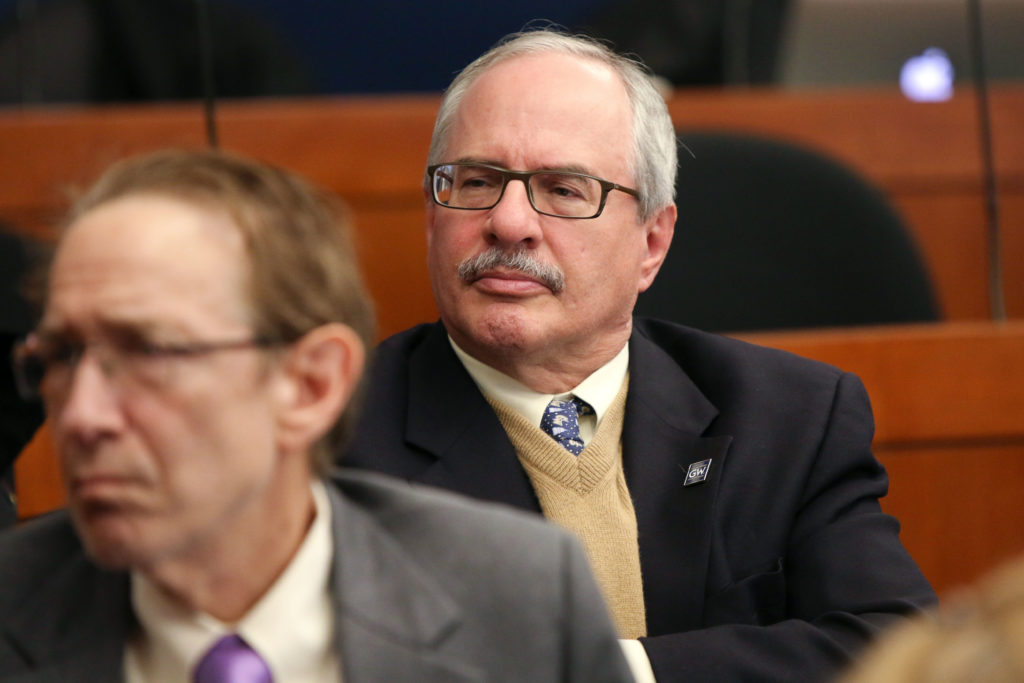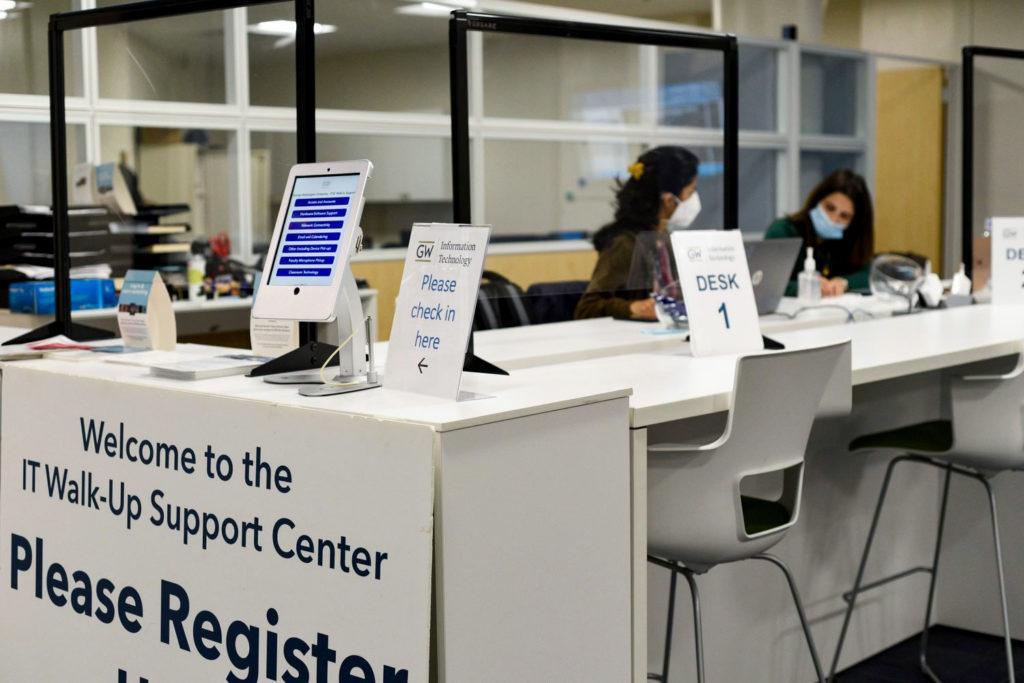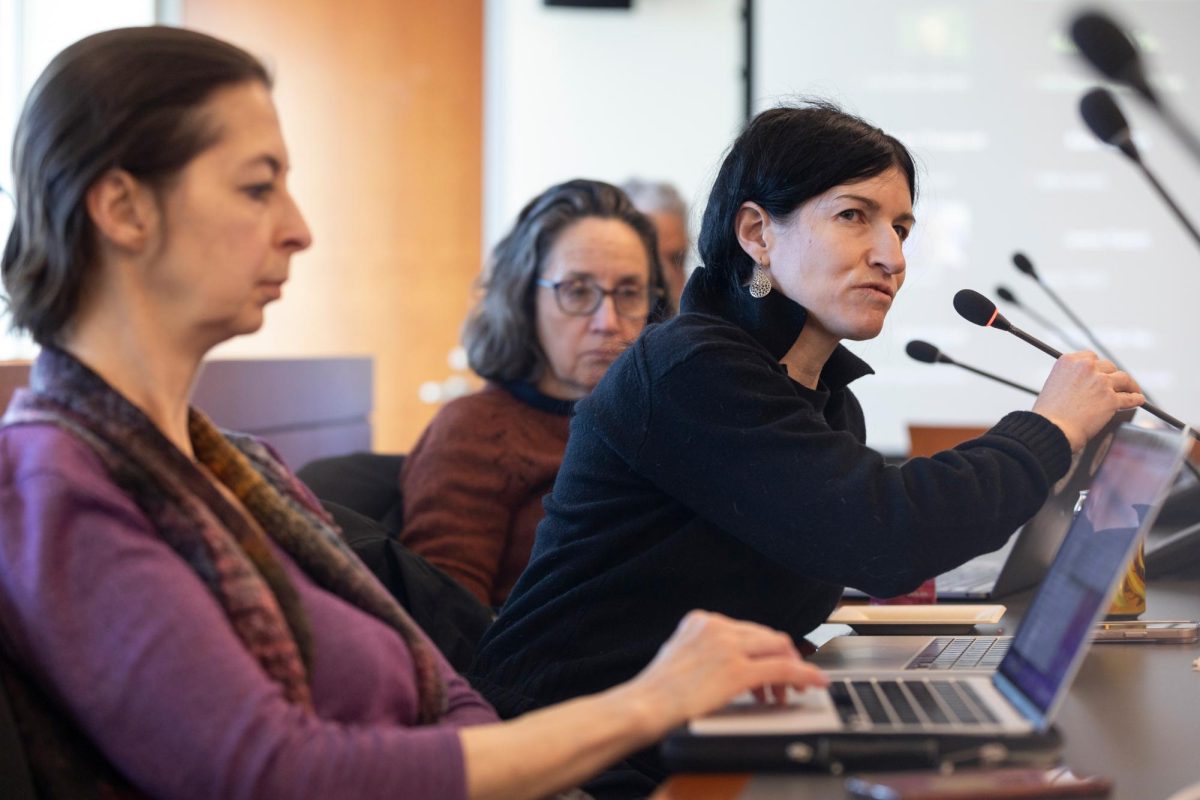Updated: Sept. 9, 2020 at 11:42 p.m.
University President Thomas LeBlanc’s support among faculty, staff and students is fading.
Soon after LeBlanc arrived at GW in 2017, he announced improving the student experience and the University’s institutional culture as two of his top priorities. But hundreds of students, faculty, staff and alumni now cite decisions he made as part of those initiatives as reason to choose new leadership.
LeBlanc began reducing the University’s undergraduate population by 20 percent while upping the share of STEM students – dubbed the 20/30 Plan. The plan was quickly met with criticism from many faculty before it was halted in April as a result of the pandemic.
Now as GW faces a $220 million annual budget shortfall, many faculty say recent decisions to lay off hundreds of employees and suspend benefits could have been avoided had the planned enrollment cut not been implemented.
More than 220 faculty and 130 students have signed a petition in recent days stating LeBlanc has “threatened” the “core values” of the University, citing the cut as part of their rationale. The signatories include at least 20 percent of the Faculty Senate.
“We need a president who understands GW and can inspire the whole community,” the petition states. “We need a president with compassion and a clear moral compass, a vision for the future that builds up GW’s reputation and the capacity to communicate effectively and steer our community through difficult times. Thomas LeBlanc is not that president.”
The petition also condemns GW’s partnership with the Disney Institute as part of the administration’s institutional culture initiative. Officials have repeatedly declined to provide the full cost of the partnership, drawing criticism from many faculty.
Marie Price, a member of the Culture Leadership Team who helped oversee the initiative, signed the petition. Price did not return multiple requests for comment.
“President LeBlanc hired the Disney Institute to ‘increase morale’ at GW, despite Disney having virtually no experience with higher education,” the petition states.
When reached for comment, LeBlanc said protecting the health, safety and care of the GW community and the University’s “core” academic mission has driven every decision during the pandemic. Administrators have consulted “extensively” with faculty, the senate, staff and the Board of Trustees about these decisions, he said.
“I want to emphasize that I firmly believe that our University benefits from the collaboration and constructive input of our faculty, staff and students,” LeBlanc said in an email. “Differing viewpoints and robust discussions on complex issues are expected and encouraged in a strong academic environment.”
He added that officials began layoffs only after implementing other cost-saving measures, like leadership pay cuts and suspensions of most capital projects and hirings. LeBlanc and most other administrators have previously declined to specify how much of a salary cut they took.
“We believe that instead of making indiscriminate, across-the-board reductions, a principled, unit-by-unit approach best supports our ability to continue to deliver our core mission of teaching and research,” LeBlanc said. “As we have done throughout this process, we will continue to discuss our options with our community and communicate about them regularly.”
Officials have declined to answer all of The Hatchet’s questions about layoffs in specific offices, but affected employees said administrators have laid off hundreds of staff, including career coaches and IT workers.
LeBlanc declined to say if he has any plans to resign. He declined to say if he regrets the Disney Institute partnership, the 20/30 Plan or the strategic plan.
Columbian College of Arts and Sciences department chairs, program heads and directors sent an open letter to LeBlanc late last month stating they were “disturbed” by administrators’ lack of transparency during the layoffs.
“These actions lead us to conclude that we cannot continue with any sense of confidence in the decisions by you and your leadership team,” the letter states.
Last week, nearly 50 faculty in the School of Business demanded administrators pause all layoffs until further consultation with faculty.
Tensions between faculty and LeBlanc were elevated after the hiring of Heather Swain last month, who later rescinded her job offer after hundreds raised concerns about her efforts to shield information from investigators during the Larry Nassar case at Michigan State University. LeBlanc has since apologized for the decision to hire her.
The senate will vote on a resolution Friday to censure LeBlanc for the hiring.
When the Faculty Association – an independent group open to all full-time faculty – met last month with more than 300 professors to discuss the Swain hiring and layoffs, members overwhelmingly supported a measure calling on the Faculty Senate to move forward with a vote of no-confidence in LeBlanc.
Almost 200 faculty members have signed an open letter to the Faculty Senate’s executive committee calling for a no-confidence vote.
Erin Chapman, the president of the Faculty Association and an associate professor of history, said at the meeting that LeBlanc and his administration are operating GW like a “corporation” with a “lack of transparency.”
“This is the continuation of a pattern of putting the burden for meeting the budget shortfall on faculty and staff, rather than the administration sharing that burden with us with their much larger salaries and rather than using the other resources that GW has at its disposal,” she said.
Chapman said the vote would generate “negative publicity” for GW that the Board will be hard-pressed to respond.
“LeBlanc and his administration are treating GW as if it were a profit-making business beholden to shareholders, shareholders who expect an annual return on an investment,” she said. “GW is not a corporation.”
Laura Schiavo, an associate professor of museum studies and a member of the Faculty Association’s steering committee, said at the meeting that even an unofficial vote of no confidence in LeBlanc would still be “meaningful” even though it will not be binding.
The Faculty Association organized a no-confidence committee, which is working to organize faculty members to call for a vote of no confidence in LeBlanc, a direct action committee, which is working to plan public protests and strikes against LeBlanc, and an organizing committee, which is working to recruit more faculty members to join the Faculty Association.
The Faculty Association will hold a protest supporting LeBlanc’s resignation in Kogan Plaza Friday.
“We are demanding the removal of LeBlanc as president of GW and for the BOT to be accountable to our community, or the whole lot has got to go!” the Facebook post announcing the rally states.
Dara Orenstein, the minister of information for the Faculty Association and a professor of American Studies, designed “GWUFA memes” – graphics describing faculty members’ disapproval for LeBlanc and the Board – criticizing LeBlanc and Board Chair Grace Speights. She said at the Faculty Association meeting last week that the graphics are for faculty members to circulate on Twitter or include on their syllabi or classroom Blackboard pages.
The graphics include various criticisms of administrators along with claims that some faculty members will give A’s to all of their students this semester and that some will be unavailable every Wednesday of the semester for grading and advising students to “unburden” faculty members from the “considerable labors of grading.”
Multiple student groups have also called on LeBlanc to resign. GW Black Defiance launched a petition calling for him to step down Wednesday, which has since received more than 800 signatures as of Friday, according to an Instagram story post.
The Student Association has condemned the Swain hiring and encouraged students to “resist” ongoing layoffs by sharing their concerns with the Board but has not called on LeBlanc to resign.
The GW College Democrats demanded LeBlanc’s resignation in a statement Monday, saying he has “harmed” the student community and “damaged” GW’s reputation through the 20/30 Plan, Swain hiring and his use of a racial analogy when discussing fossil fuel divestment in February.
“Change cannot wait when a University makes Black and brown students feel like outsiders on their own campus, nor can it wait when faculty have lost confidence in the administration,” the group said in the statement. “LeBlanc can no longer serve effectively and needs to resign.”
This post has been updated to clarify the following:
This post has been updated to clarify a paraphrase from Laura Schiavo.








